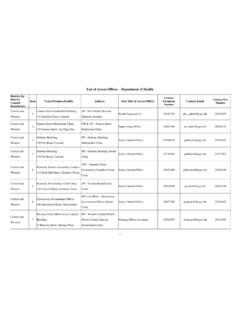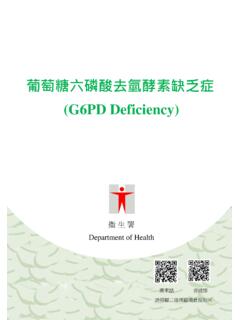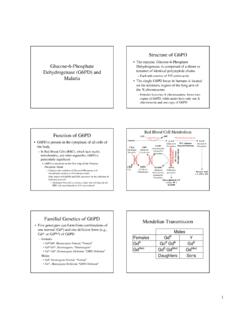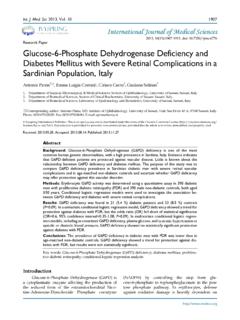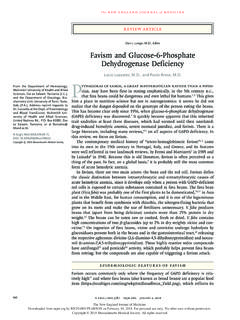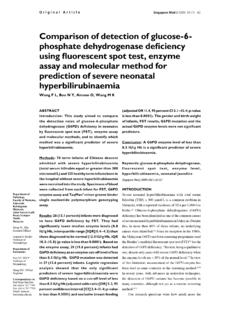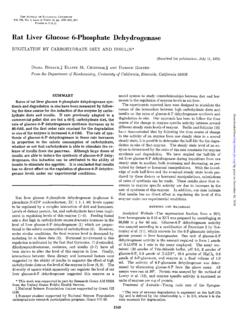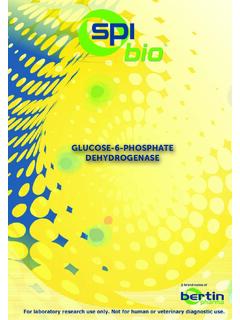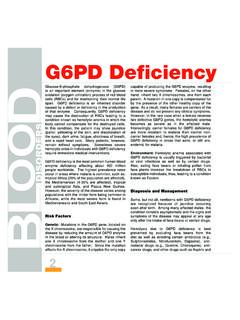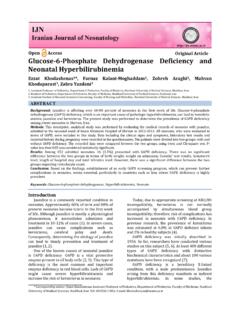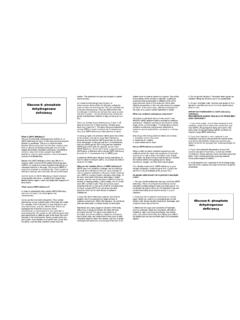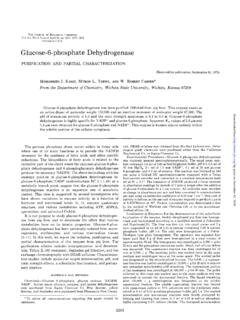Transcription of Glucose-6-Phosphate Dehydrogenase (G6PD) Deficiency
1 Glucose-6-Phosphate Dehydrogenase (G6PD) Deficiency What is Glucose-6-Phosphate Dehydrogenase (G6PD) Deficiency ? Glucose-6-Phosphate Dehydrogenase (G6PD) is an enzyme which protects the red blood cells and prevents them from being damaged. People with G6PD Deficiency usually have a normal health. But once they suffer from severe infection or are exposed to oxidative stimuli such as certain drugs, chemical agents, large amount of red blood cells will be damaged and broken down, leading to acute haemolysis. Bilirubin will be produced as the red blood cells are broken down during acute haemolysis, resulted in jaundice. Without timely treatment to the newborn babies with severe jaundice, excessive bilirubin levels in the blood may accumulate in the brain, leading to irreversible brain damage.
2 Consequently, mental retardation, cerebral palsy and hearing deficit, or even death will occur. What are the causes of G6PD Deficiency ? G6PD Deficiency is a genetic condition with an X-linked recessive inheritance, therefore males are more likely to be affected by this condition. In Hong Kong, the incidence of G6PD Deficiency is around in males and in females. Their brothers have 50% chance to be affected, while their sisters have 50% chance to be gene carriers. X-linked Recessive InheritanceWhat are the precautions should the affected people take G6PD Deficiency is an inheritable and life-long condition. There is no cure of the disease. In order to prevent acute hemolysis after exposure to oxidative stimuli, affected people should take the following lifelong precautions: 1.
3 * Avoid Chinese herbal medicines such as: Rhizoma Coptidis (Huang Lien) Flos Lonicerae (Kam Ngan Fa) Flos Chimonanthi Praecocis (Leh Mei Hua) Calculus Bovis (Niu Huang) Margaritas (Pearl powder) ( Counter drugs such as Bo Ying Compound which contains Margaritas, etc.) 2.* Avoid Western medicines such as:- Certain Antipyretics-Antibiotics such as:Nitrofurantoin Nalidixic acid Sulfamethoxazole -Antimalarials such as:Primaquine -Antispasmodics such as:Phenazopyridine * This list is not exhaustive. Please consult your eating fava or broad beans and close contactwith mothballs(Naphthalene) and Naphthalene-containing products. 5. Mothers who are breastfeeding their babies with G6PD Deficiencyshould consult doctor before taking any Chinese or Western Pregnant ladies should inform their medical and nursing staff aboutany family history of G6PD Fava / Broad beans What are the precautions should the affected people take 7.
4 Inform your doctor or medical staff about your health condition duringconsultation, or show your G6PD Deficiency alert card to your hemolytic crisis, affected subjects will develop yellowish skinand mucosal membranes including the whites of the eyes. They may passdark coloured ** Neonates may look pale, seem lacking energy and becomeexcessively ** Older children or adults may complain of tiredness, breathlessnessand rapid heartbeats. **Please consult your doctor without delay if the above signs and symptoms are observed. If the above precautions are taken, the affected people will enjoy normal growth and health. Hotline: 2361 9979 Website: Genetic Screening Unit Clinical Genetic Service Department of Health DH2289 Rev.
5 2016

